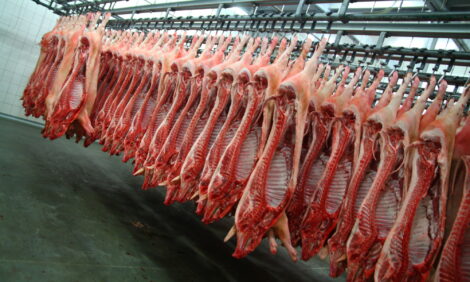



Researchers Study Ways to Protect Immune Systems of Young Pigs
By the USDA's Agricultural Research Service - A piglet today is commonly weaned from its mother after 18 to 21 days, and sometimes as early as 10 days, because diets now available are much better suited to the piglet's immature digestive system and support a rate of growth desirable to producers in the United States. However, the piglet's immune system may still be vulnerable at that age to infection from pathogens.
During weaning, pigs eat less and gain less weight, which leaves them vulnerable to disease. That's why producers often rely on low-dosage, subtherapeutic treatments of antibiotics to increase the animal's health and productivity. This usage has improved the feed-to-weight gain ratio while also decreasing illness and morbidity. However, the practice has also been implicated in the emergence of antibiotic-resistant strains of common food-borne illnesses.
If natural, yet still affordable, supplements could be found to increase the health and feed intake after weaning, then the overall well-being and growth performance of pigs would be improved. Also, pigs would reach market faster, which saves the producer feed, as well as medication and facility costs.
 |
Carroll, currently the research leader at the Livestock Issues Research Unit located north of Lubbock, Texas, says it's been known that fish oils containing long-chain omega-3 fatty acids can be nutritious additions to a person's diet because they appear to lower the risk of cholesterol and heart disease. However, the Columbia studies showed that compared to corn oil and other supplements, different levels of menhaden fish oil helped 18-day-old pigs better prepare to fight off endotoxin challenges. The omega-3 fatty acids are absorbed through the intestine and help the immune cells cope with disease. U.S. producers could benefit from this finding because fish oil is less expensive than antibiotics.
In addition to fish oil supplementation, Carroll and Allee evaluated the use of the protein supplement spray-dried plasma. They found that spray-dried plasma, like fish oil supplements, offers immune protection to the pig. Growth and performance are enhanced because nutrients from the pigs' feed are diverted to growth rather than utilized for immune functions. Carroll says it has been estimated that 20 to 35 percent of nutrients are at times diverted to the maintenance of the immune system and fighting off pathogen challenges. Carroll says the spray-dried plasma offers the piglets protection until their own immune systems take over when they are about 35 days old.
The researchers found that both supplements offer immune protection, but that they alter the immune system in two different ways. Fish oil offers protection at the cellular level of the immune system, while spray-dried plasma, which showed the most results of the two supplements, appears to provide protection at the intestinal level.
In a related study, spray-dried plasma and glutamine - an amino acid essential in some species' response to inflammation following infection or injury - were examined to determine how they would respond to challenges from Escherichia coli. Spray-dried plasma had already been known to reduce the excretion of E. coli by preventing intestinal pathogen invasion and the destruction of the intestinal mucosal barrier in weaning pigs, so researchers wanted to study glutamine. They found both were effective as supplements for preventing normal intestinal integrity and function.
Carroll reports that his work with nutritional supplements is continuing at his new location. He and his collaborators are studying additional natural supplements and will soon be transferring this line of research into studies with cattle.
Source: USDA Agricultural Research Service - June 2005








